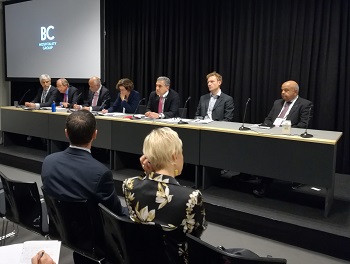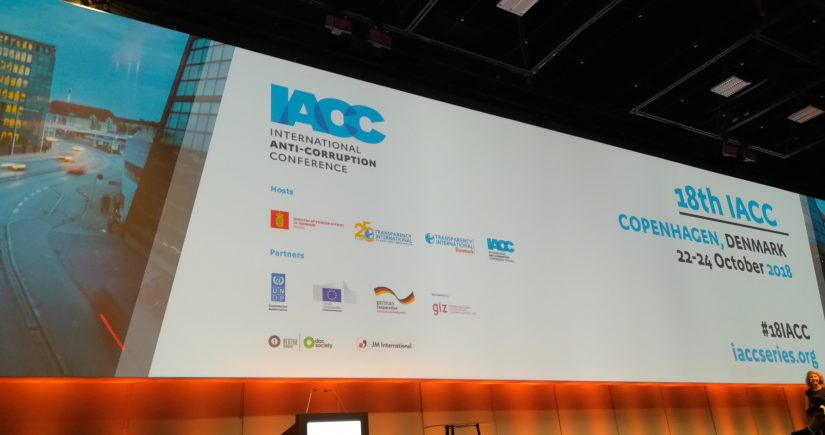At this year’s International Anti-Corruption Conference CoST joined a high-level panel to put the issue of corruption in public infrastructure high on the agenda and to propose tried and tested approaches to address the issue.

Speaking on behalf of CoST, Chrik Poortman, CoST Chair joined other panelists Pravin Gordhan, Minister of Public Enterprises, South Africa, H.E. Yama Yari, Minister of Public Works, Afghanistan and representatives from Trenes Argentinos, Asian Infrastructure Investment Bank and the United Nations Office for Project Services.
With their varied backgrounds and perspectives, each speaker brought different contextual experiences to the session and all highlighted how infrastructure sector characteristics, including its complex delivery and significant investment needs, make it highly susceptible to corruption. Furthermore, when Public Private Partnership projects are involved this susceptibility increases. The panel also stressed that corruption, alongside other key issues of mismanagement and inefficiency, are problems found across the whole of the project cycle and so attention must be comprehensive rather than specifically focussed on pre-tender stages of projects.
Using the example of Zambia, Mr Poortman highlighted how great savings can be when these key issues are addressed. A recent Economist article for example, pointed out that the average cost per km of road in Zambia was $360,000 – almost double that of other sub-Saharan African countries, raising questions on the efficiency of its infrastructure delivery. Mr Poortman emphasised how initiatives such as CoST, with its core features of disclosure, assurance, multi-stakeholder working and social accountability, can offer a pragmatic solution and are propelling a shift towards greater transparency and accountability in infrastructure.
Beginning with our disclosure feature, Mr Poortman emphasised its comprehensive nature – focussing on promoting data disclosure of infrastructure projects in accordance with the CoST Infrastructure Data Standard (CoST IDS) which uses 40 key data points (or items) across the entire project cycle – from identification, preparation, procurement, implementation and completion.
Since we began in 2012, 17 countries have applied the CoST IDS, including those as diverse as Afghanistan, El Salvador, Ethiopia and the United Kingdom. Furthermore, the CoST IDS has been incorporated into key standards, frameworks and tools, including Transparency International’s new ‘Gold Standard’ Integrity Pact and the Global Infrastructure Basel Standard for Sustainable and Resilient Infrastructure.
Mr Poortman also highlighted the importance of our multi-stakeholder feature which brings together government, industry and civil society to pursue infrastructure transparency with an equal voice. He said: “It is not always easy, but this is a paradigm shift and a switch to greater collaboration, where all parties can see the benefits to them and trust is built.”
A clear example of effective multi-stakeholder working can be shown through the example of Malawi, where its multi-stakeholder group (MSG) from vastly different backgrounds showed persistence during a turbulent period of the country’s major corruption scandal – ‘Cashgate’. During this time, proponents of anti-corruption were subject to threats and attacks but the Malawi MSG built strong networks with other organisations and demonstrated they could not be silenced. This then meant they could take advantage of the changing political tone which followed the scandal and gain traction.
In each CoST country, MSGs help to promote key messages raised through our assurance process to decision makers, the media and civil society. The assurance process helps to translate complex data from infrastructure projects into compelling information, so it can be easily understood and used by civil society and the media to prompt accountability. Mr Poorman explained, “Data is a powerful tool, but it needs to be made accessible and relevant for the concerns that civil society have.”
By applying our four key features together, CoST members have promoted integrity in infrastructure and ensured savings made by reducing corruption, mismanagement and inefficiency are directed to other essential services. For example, in Guatemala, we helped to cancel a project on the Belize Bridge which saved the potential miss-appropriation of US$5 million and in Malawi we helped to terminate a contract on the Thyolo-Bangula road which included poor quality work and a cost increase of 262%.
